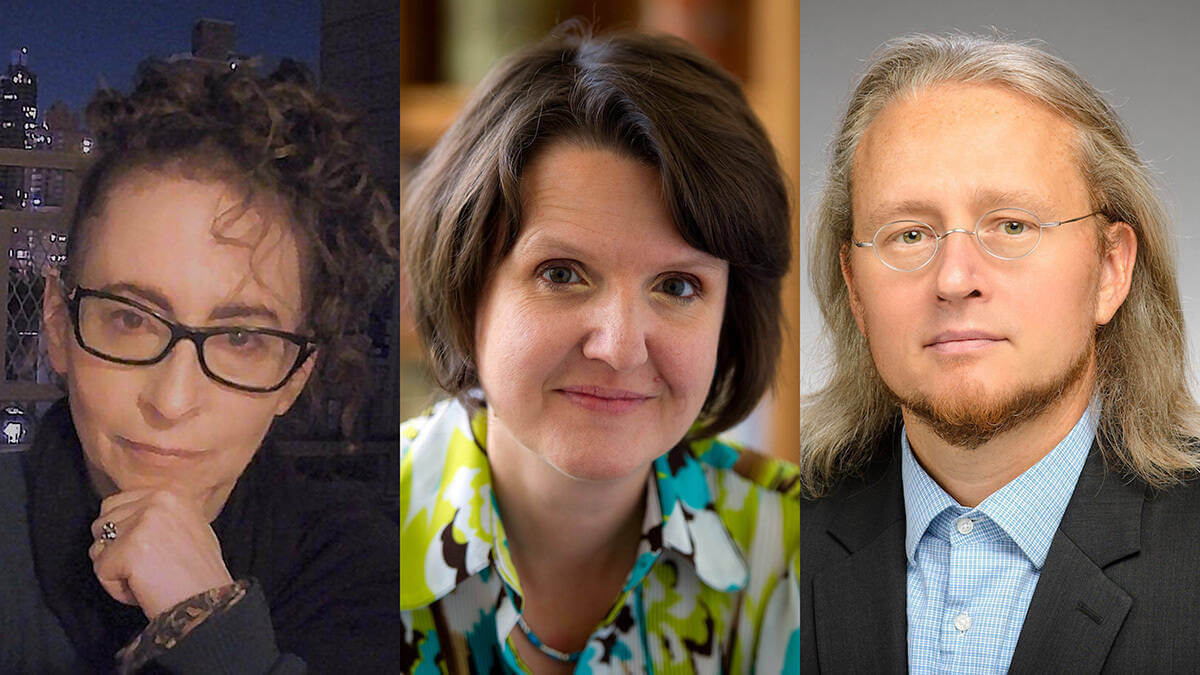Three Notre Dame faculty named 2024 Guggenheim Fellows

Three faculty members in the University of Notre Dame’s College of Arts and Letters have been awarded 2024 Guggenheim Fellowships in recognition of their career achievements and exceptional research promise.
Barbara Montero, a professor of philosophy; Gretchen Reydams-Schils, a professor in the Program of Liberal Studies; and Roy Scranton, an associate professor of English and director of the Creative Writing Program and the Environmental Humanities Initiative, are among the 188 scholars, scientists and artists chosen from approximately 3,000 applicants for the fellowship. The Guggenheim Foundation awards these fellowships to outstanding scholars in order to add to the educational, literary, artistic and scientific power of the country.
“I am thrilled that three of our faculty members have joined the prestigious ranks of scholars who have had their research supported by the Guggenheim Foundation,” said Sarah Mustillo, the I.A. O’Shaughnessy Dean of the College of Arts and Letters.
“This is a high honor and tremendous recognition of the ambitious, valuable scholarship that is being done by Arts and Letters faculty across our humanities disciplines.”
Guggenheim Foundation President Edward Hirsch said the fellows are meeting head-on the profound existential challenges facing humanity and are “generating new possibilities and pathways across the broader culture.”
Twenty-two Notre Dame faculty members have won Guggenheims in the past 24 years. Other recent awardees include English professor Joyelle McSweeney in 2022 and Pam Wojcik, the Andrew V. Tackes Professor of Film, Television, and Theatre and department chair, in 2020.
Montero’s project, “Things That Matter: Actual-World Metaphysics and the Mind-Body Problem,” explores what philosophy can tell us about ourselves and the world we live in. Her prior research has focused on two different notions of the body: as a physical or material basis of the mind and as a moving, breathing, flesh-and-blood instrument that people use when they run, walk, dance and play.
Reydams-Schils, who has concurrent appointments in classics, philosophy and theology, will seek to retrieve aspects of human perfection in antiquity — ancient times before the Middle Ages — that are empowering and relevant. Her project is titled “‘Becoming like God’: Perfection in Platonism and Stoicism (1c. BCE-2c. CE).”
Scranton — an essayist, novelist, literary critic and climate philosopher — will pursue a project about the survival of the planet. “Ethical Pessimism: Climate Change and the Limits of Narrative” is an attempt to reckon with global political failures, he said, and inject intellectual humility into the conversation.
Now in its 99th year, the Guggenheim Foundation has granted more than $400 million in fellowships to more than 19,000 people, including 125 Nobel laureates and winners of the Pulitzer Prize and National Book Award.
The College of Arts and Letters’ Institute for Scholarship in the Liberal Arts offers support to faculty across the arts, humanities and social sciences in applying for major national and international fellowships, including the Guggenheim.
“The Guggenheim Fellowship is a very highly prestigious honor that represents a major achievement for these faculty members,” said Josh Tychonievich, ISLA’s associate director for research development. “Only about 6 percent of applicants in a given year are awarded a fellowship. That three of these fellowships were awarded in Arts and Letters attests not only to our outstanding faculty but also to the strong research culture of the college.”
Latest Faculty & Staff
- In new research, Roy Scranton explores climate change and the limits of human progressIn his most recent book, “Impasse: Climate Change and the Limits of Progress,” Scranton, an associate professor of English, defines the impasse he sees as “not only political and institutional, but cognitive, existential and narrative” and asserts that the only path forward is through embracing what he terms ethical pessimism. “A lot of people confuse pessimism with nihilism, apathy and despair,” Scranton said. “But pessimism is actually about recognizing our limits, letting go of unrealistic goals, finding solidarity in the fact of human suffering and doing what you can now, not in some utopian future.
- Joule Bergerson, energy technology assessment expert, named new director of ND EnergyND Energy faculty director Joule…
- In memoriam: Alasdair MacIntyre, the Rev. John A. O’Brien senior research professor of philosophy emeritusAlasdair MacIntyre, the Rev. John A. O’Brien senior research professor of philosophy emeritus and a permanent senior distinguished research fellow at the de Nicola Center for Ethics and Culture, died on May 21, 2025. He was 96.
- Santiago Schnell, dean of Notre Dame’s College of Science, appointed as provost of DartmouthSantiago Schnell, the William K. Warren Foundation Dean of the College of Science at the University of Notre Dame, has accepted an appointment as provost at Dartmouth College. He will depart Notre Dame at the end of June and begin his new role in July.
- Notre Dame’s Fightin’ Irish Battalion receives Department of Defense award as nation’s top Army ROTC programThe United States Department of Defense honored the University of Notre Dame’s Army ROTC Fightin’ Irish Battalion as the nation’s top Army collegiate program for the 2023-24 academic year. This will be the first time the unit has received the department’s Educational Institution Partnership Excellence Award, which recognizes the program’s achievements in recruiting, educating, training and commissioning leaders of character to be the next generation of military officers.
- In memoriam: Karl Ameriks, the McMahon-Hank Professor of Philosophy EmeritusKarl Ameriks, the McMahon-Hank Professor of Philosophy Emeritus at the University of Notre Dame, died on April 28 from pancreatic cancer. He was 77. Born in post-World War II Germany, Ameriks’ family emigrated to the United States when he was a child, and he grew up in Detroit, Michigan. He received his bachelor’s and doctoral degrees from Yale University. He came to the Department of Philosophy at Notre Dame in 1973 during a formative time for the department, which had transitioned from a predominantly Thomist focus to the more analytical American philosophy in the 1960s.











